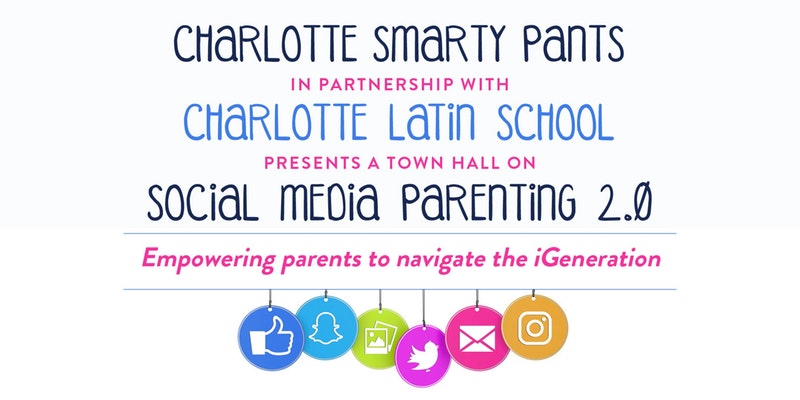Thank you so much for coming to the Smarty Town Hall on Social Media Parenting 2.0. And a HUGE thanks to Charlotte Latin School for hosting such an amazing event. The following is a list of resources parents and educators can use to further educate themselves on social media parenting. Let’s keep the conversation going!
Social Media Parenting Resources
HANDS-ON SOCIAL MEDIA WORKSHOP:
Should you post that? Sharenting
Common Sense Family Media Agreement K-5
What you need to know about SnapChat
SnapChat on Common Sense Media
How to raise “nice girls” on Instagram
Step-by-Step Tips to set up your kids iphone Common Sense Media
Apps stirring up trouble in schools – Common Sense Media
Parents’ Ultimate Guide to Musical.ly – Common Sense Media
![]()
MIDDLE AND HIGH SCHOOL TECHNOLOGY ISSUES:
“You Do Have a Choice”
“The Interview that Broke the Internet”
![]()
Screen Time Articles
http://www.aappublications.org/news/2017/05/04/PASScreenTime050417
https://www.aap.org/en-us/advocacy-and-policy/aap-health-initiatives/Pages/Media-and-Children.aspx
This one has links to multiple AAP statements on screen time and each of these references the studies that they used:
https://www.healthychildren.org/English/family-life/Media/Pages/Where-We-Stand-TV-Viewing-Time.aspx
![]()
STRATEGIES FOR DELAY:
– Take time to educate yourself about the psychological, physiological, and social impacts of handheld devices relative to child development and appropriateness.
– Talk with your spouse about where your values lie and how you want to approach parenting around personal devices. Then, communicate that plan with your children and continue to keep the dialogue open.
– Remember, YOU are the parent(s) and you make decisions for your children that are in his/her best interest. In addition to adolescent peer pressure, adult peer pressure exists in our culture. Acknowledge it, and parent accordingly.
– Engage in dialogue around devices (and around any parenting topic, for that matter). There is much to be learned and power to be gained through communication and connection.
– Be proactive in setting rules/guidelines around tech use for your family prior to integrating devices into your children’s lives
– When an opportunity arises, talk with your children about why you are choosing to delay for them. Tweens/teens appreciate the “why” – they won’t necessarily like what you’re saying, but having context empowers the parent and gives the child language for when they are feeling uncomfortable with being “the only one.”
– Keep the dialogue open with your children, especially in the tween/teen years.
– Knowledge is power. For adults AND children.
WHEN YOU DECIDE TO INTEGRATE PERSONAL DEVICES INTO YOUR CHILDREN’S WORLD:
– Be intentional. What is the purpose of the device?
– Consider a graduated approach, ie – start with computer/email, slowly and appropriately moving on to flip phone and finally a smartphone
– Be transparent with your child in your intention to stay plugged in to your child’s online activity
– Pay attention to the age limits on apps
– Set restrictions on the smartphone, itself
– Keep personal devices out of the bedroom
– Help your children learn to self-regulate through limits and conversation
– Texting/social media is best used for maintaining relationships, not building them.
– Protect family time
– Create intention around face to face interactions and connections
ONLINE PARENT RESOURCES:
http://www.familiesmanagingmedia.com
BOOK SUGGESTIONS:
The Big Disconnect, Catherine Steiner-Adair
How to Raise an Adult, Julie Lythcott-Haims
iGen, Jean M. Twenge
Mind Change, Susan Greenfield
Wired Child, Richard Freed
Girls on the Edge, Leonard Sax
Boys Adrift, Leonard Sax



